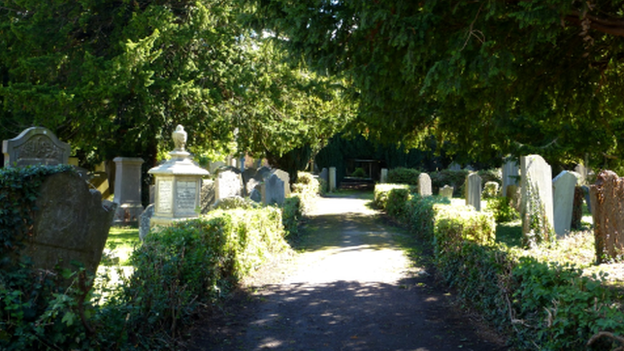Goldenbridge Cemetery reopens after 150 years
- Published

Goldenbridge Cemetery was founded in 1828 by the Catholic Emancipator, Daniel O'Connell
An Irish cemetery founded by Daniel O'Connell in the early 19th Century has reopened to the public after almost 150 years.
Goldenbridge Cemetery in Dublin was the first non-denominational graveyard on the island of Ireland - and was used by people of all religions and none.
O'Connell, an MP who led the campaign to end religious discrimination against Catholics, opened Goldenbridge in 1828.
It shut over a dispute with the British War Office but reopened at the weekend.
Until now, the gates of the two-acre site in the Dublin suburb of Inchicore had been locked and visits were permitted by appointment only.
Catholic ban
About 250 people attended a rededication ceremony at the graveyard on Sunday, which marked the opening of the site as a historical landmark and a working cemetery.
Wreaths were laid at the reopening ceremony on Sunday
The attendees heard an extract from one of O'Connell's speeches, in which he said: "We wish to live on terms of amity and affection with our brother Protestant fellow-countrymen.
"We earnestly desire to be united with them in our lives, and not to be separated from them in death".
The Irish barrister and politician founded the graveyard at a time when Catholics were banned from having their own dedicated cemeteries.
They were also banned from taking seats in the House of Commons and many other public offices.
That began to change when O'Connell, a Catholic Irish nationalist from County Kerry, won a Commons seat to represent the County Clare constituency in 1828.
An actor in period costume read an extract of a speech by Daniel O'Connell
His election helped to pressurise the government into passing the 1829 Catholic Emancipation Act, which restored some of the civil liberties they had lost after the Reformation.
Goldenbridge cemetery is now run by the Glasnevin Trust, and members of the public will now be able to buy new grave plots at the site.
Contamination fears
The trust is the largest provider of funeral services in the Republic of Ireland and is governed by the Dublin Cemeteries Committee, which O'Connell established in 1828.
The chairman of trust, John Green, told BBC News NI that the British military authorities originally objected to Goldenbridge over fears that the burials would contaminate their water supply.
He said the cemetery was close to Dublin's Grand Canal, which at that time was used as a source of drinking water by British troops based at nearby Richmond Barracks.
The complaint went all the way to the Lord Chancellor's office, before a decision was taken to shut the graveyard.
However, Mr Green added that an inspection of the site revealed it had good drainage, and said a more likely reason for the military objection was that troops frequently ended up in pubs with mourners after the many funerals held at the site.
Goldenbridge is a 19th century ‘garden’ cemetery and was open to people of all creeds and none
The project to reopen the cemetery coincided with the refurbishment of Richmond Barracks as an exhibition centre.
Sunday's ceremony was held on the eve of the 170th anniversary of O'Connell's death and a wreath was laid in his memory.
Vandalised
Among the graves at Goldenbridge is that of first leader of the Irish Free State - William Thomas (WT) Cosgrave.
He served as the first President of the Executive Council - effectively the first Irish prime minister - from 1922 to 1932.
Cosgrave's legacy divides opinion and his grave has been vandalised in repeated attacks.
Last year, it was one of 12 graves badly damaged days before the centenary of the 1916 Easter Rising.
WT Cosgrave's headstone was smashed at the site last year
However, at the time Mr Green told the BBC he could not be sure the vandalism was politically motivated, as the site was regularly a target for serious anti-social behaviour, including drug dealing.
It is hoped the reopened graveyard will have potential as a tourist attraction.
- Published17 March 2016
- Published17 October 2014